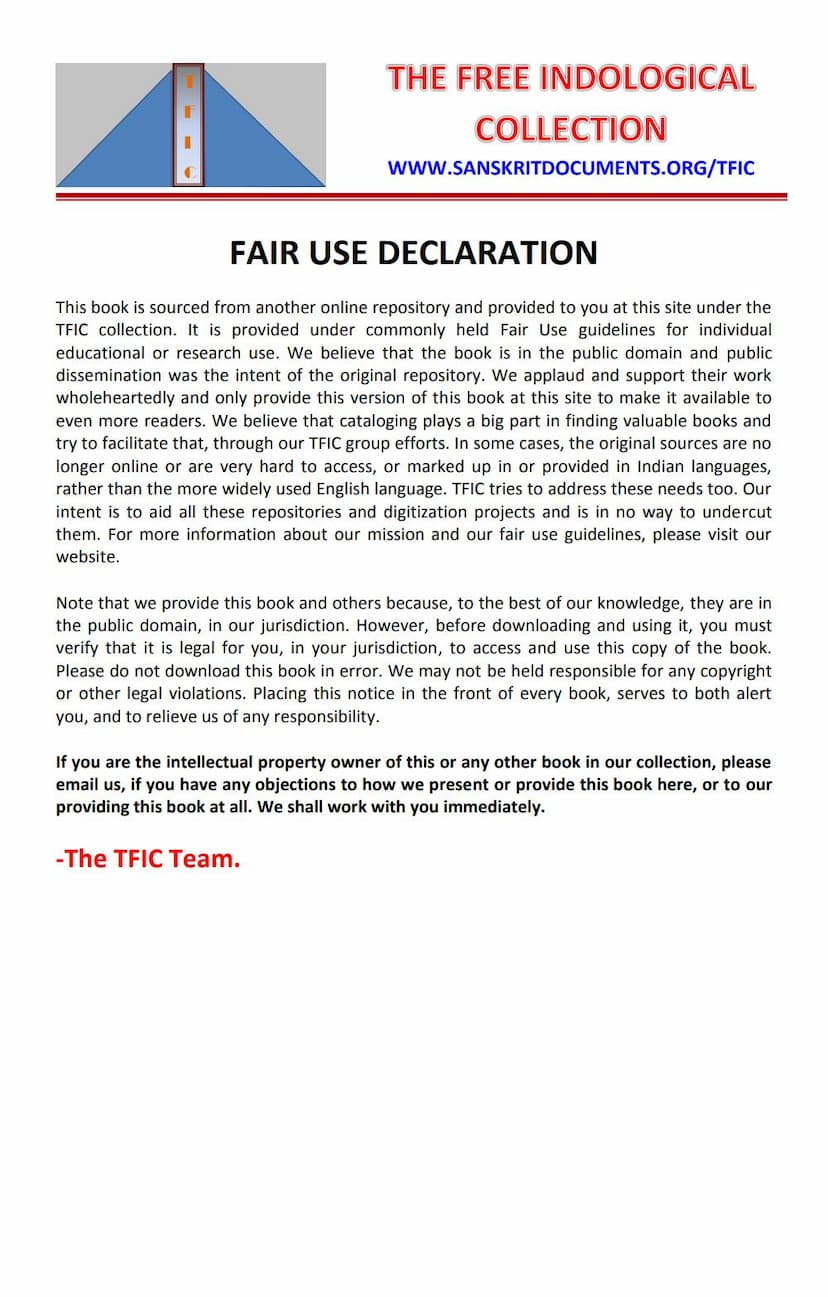Parshvanath
Added to library: September 2, 2025

Summary
This document is a Jain religious text titled "Parshvanath," authored by Pandit Muni Shri Chauthmalji Maharaj and published by Gangadevi Jain Delhi. It is part of the "Free Indological Collection" and provided for personal educational or research use under Fair Use guidelines.
The book focuses on the life and teachings related to Lord Parshvanath, the 23rd Jain Tirthankara. It delves into his past lives, explaining the significance of recounting these to understand his path to enlightenment and to demonstrate that even ordinary souls can achieve divine status through dedicated spiritual practice. The text also highlights the theoretical importance of past lives in Jain philosophy, particularly in refuting the concept of an eternally omniscient and uncreated God by showing that even the highest spiritual beings were once ordinary souls.
The narrative begins with the First Birth, detailing the life of King Arvind in Potanpur. King Arvind is portrayed as a just and pious ruler who deeply cared for his subjects. The text contrasts the dharma-prajana (religious devotion) of Queen Dharini, his wife, and the unwavering faith of Vishwabhuti, the royal priest who adhered strictly to Jain vows. It then criticizes the decline in religious conviction among modern followers, who are swayed by worldly fears and temptations, even abandoning their faith for material benefits or educational opportunities. The story introduces Vishwabhuti's sons, Marubhuti (virtuous) and Kamatha (wicked), setting the stage for future conflicts.
The text then moves to the Second Birth, where Marubhuti is reborn as an elephant in the Vindhya mountains, and Kamatha's wife is reborn as a female elephant in the same herd. King Arvind, after witnessing the impermanence of worldly affairs, decides to renounce his kingdom and embrace Jain monasticism. The detailed description of his ascetic practices and the ensuing philosophical discussions with his queens and a merchant named Sagardatta illustrate the principles of renunciation and spiritual pursuit.
The narrative continues through multiple rebirths:
- Third Birth: Marubhuti is reborn as a celestial being in the Sahasrar heaven, while Kamatha's soul is reborn as a serpent in the fifth hell.
- Fourth Birth: Marubhuti is reborn as Prince Karanveg in Tilkapuri, a virtuous ruler who later renounces his kingdom to become a monk. His father, King Vidyutveg, also renounces his worldly possessions and becomes a monk.
- Fifth Birth: Marubhuti is reborn as a divine being in the twelfth heaven, while Kamatha's soul is reborn as a poisonous snake. Prince Karanveg (Marubhuti's soul), after his death as a prince, also attains a higher celestial abode.
- Sixth Birth: Marubhuti is reborn as Vajranabha, son of King Vajravirya, and later attains liberation. Kamatha's soul is reborn as a serpent and subsequently experiences hellish existence. The text emphasizes the importance of the "Twelve Reflections" (Dvadasa Bhavana) – Anitya (impermanence), Anasharan (helplessness), Ekattva (aloneness), Sansar (cycle of birth and death), Shuchi (impurity), Asamanya (non-attachment), Asvada (non-relish), Marana (death), Shuddhi (purity), Dharma (righteousness), Bodhi (enlightenment), and Deshana (teachings) – as essential steps for spiritual progress. It highlights the role of proper understanding of Dev (God), Guru, and Dharma, warning against false gurus and their followers.
The book then describes the Birth of Lord Parshvanath, detailing his conception, the auspicious dreams of Queen Vamadevi, and the regal upbringing of Prince Parshva. It also recounts his early experiences, including his victory over the Kaling King in a conflict over Princess Prabhavati of Kushasthala, demonstrating his justice and righteousness.
The text further narrates Lord Parshvanath's practice of asceticism and the "Tapas Pratibodh" (enlightenment of the ascetic), where he confronts and reforms a corrupt ascetic named Kamatha. This section emphasizes the importance of true asceticism versus ostentatious displays of penance.
"Upasarga" describes the trials and tribulations Lord Parshvanath faced from the demon Meghamali and the protective intervention of Dharanendra and Padmavati, illustrating the power of spiritual fortitude.
The book details the "Kevalgyan" (omniscience) attained by Lord Parshvanath and the establishment of the "Samavasarana" (divine assembly) where he preached the Jain dharma. The text explains the five types of knowledge (Mati, Shruta, Avadhi, Manahparyaya, and Kevala) and the principles of the Jain faith, including the rejection of casteism and the emphasis on universal love and compassion.
The latter part of the book discusses "Dharma-deshana" (religious discourse) by Lord Parshvanath, covering the significance of charity (Daan), chastity (Sheel), penance (Tapas), and contemplation (Bhavana) as paths to liberation. It also touches upon the importance of righteous conduct, the correct understanding of spiritual principles, and the avoidance of misleading doctrines and practices.
Finally, the "Nirvana" section describes Lord Parshvanath's attainment of liberation (Moksha) on Sammed Shikhar mountain. The "Parishista" (Appendix) addresses the perceived differences between the teachings of Lord Parshvanath and Lord Mahavir, particularly regarding the four Mahavratas and five Mahavratas, clarifying that these are due to differing enumerations rather than contradictions in core principles.
The book concludes with the "Chintamani Parshvanath Stotra", a devotional hymn dedicated to Lord Parshvanath.